Critical Analysis of Teamwork in Nursing: A Professional Perspective
VerifiedAdded on 2022/11/28
|9
|2010
|476
Essay
AI Summary
This essay critically analyzes the relationship between being a professional nurse and working as part of a team, focusing on the challenges and benefits faced by new graduate nurses. The introduction highlights the nurse's role in healthcare teams, emphasizing their responsibilities in patient care and advocacy. The critical analysis delves into the difficulties new nurses encounter, such as high expectations, blame culture, and bullying, while also exploring the advantages of teamwork, including enhanced learning opportunities, improved communication, and increased accountability. The discussion section emphasizes the importance of therapeutic relationships and communication skills for professional development. The conclusion summarizes the positive impact of teamwork on nurses' ability to become efficient professionals. The essay draws on various research sources to support its arguments, providing a comprehensive overview of teamwork in nursing and its impact on professional practice.
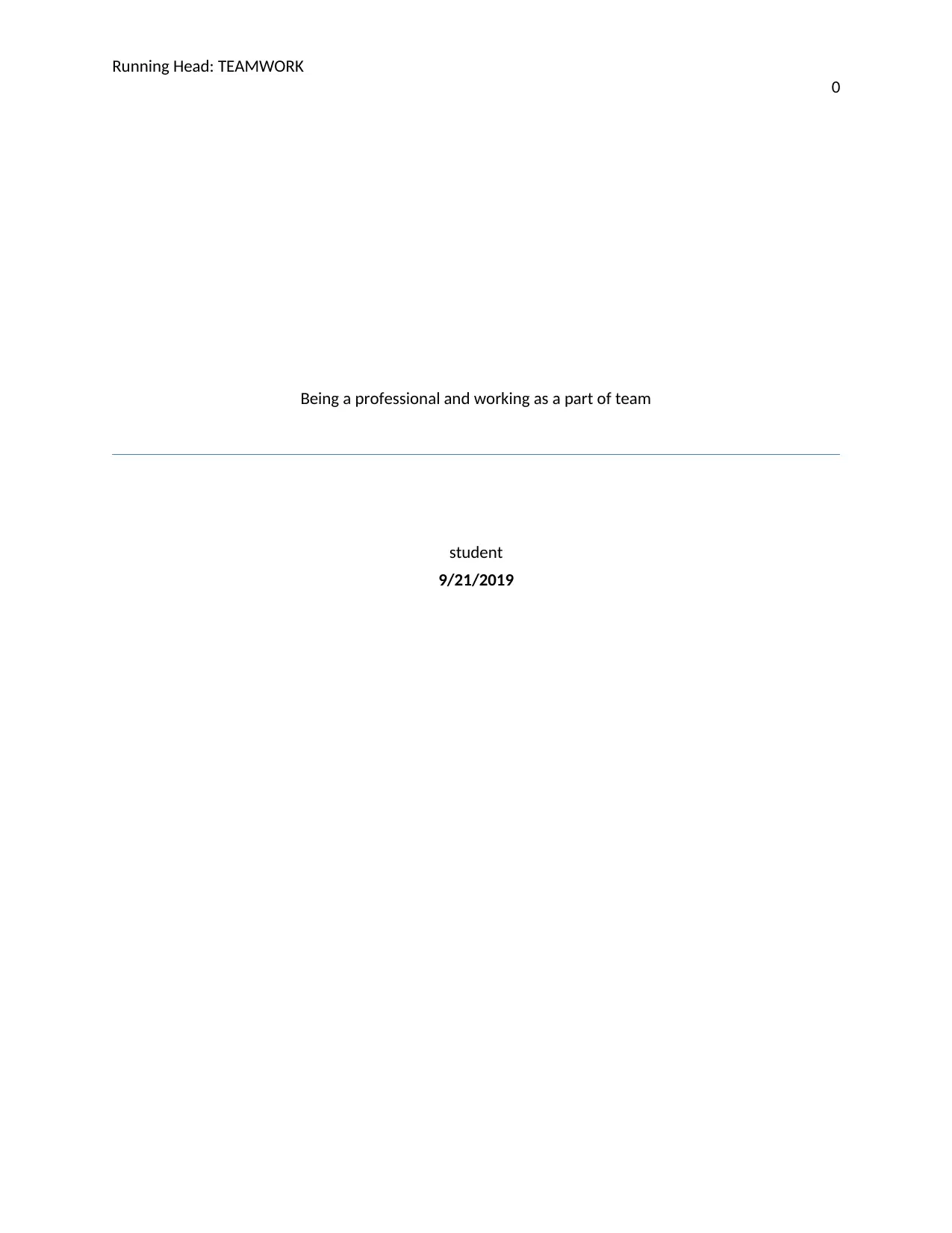
Running Head: TEAMWORK
0
Being a professional and working as a part of team
student
9/21/2019
0
Being a professional and working as a part of team
student
9/21/2019
Paraphrase This Document
Need a fresh take? Get an instant paraphrase of this document with our AI Paraphraser
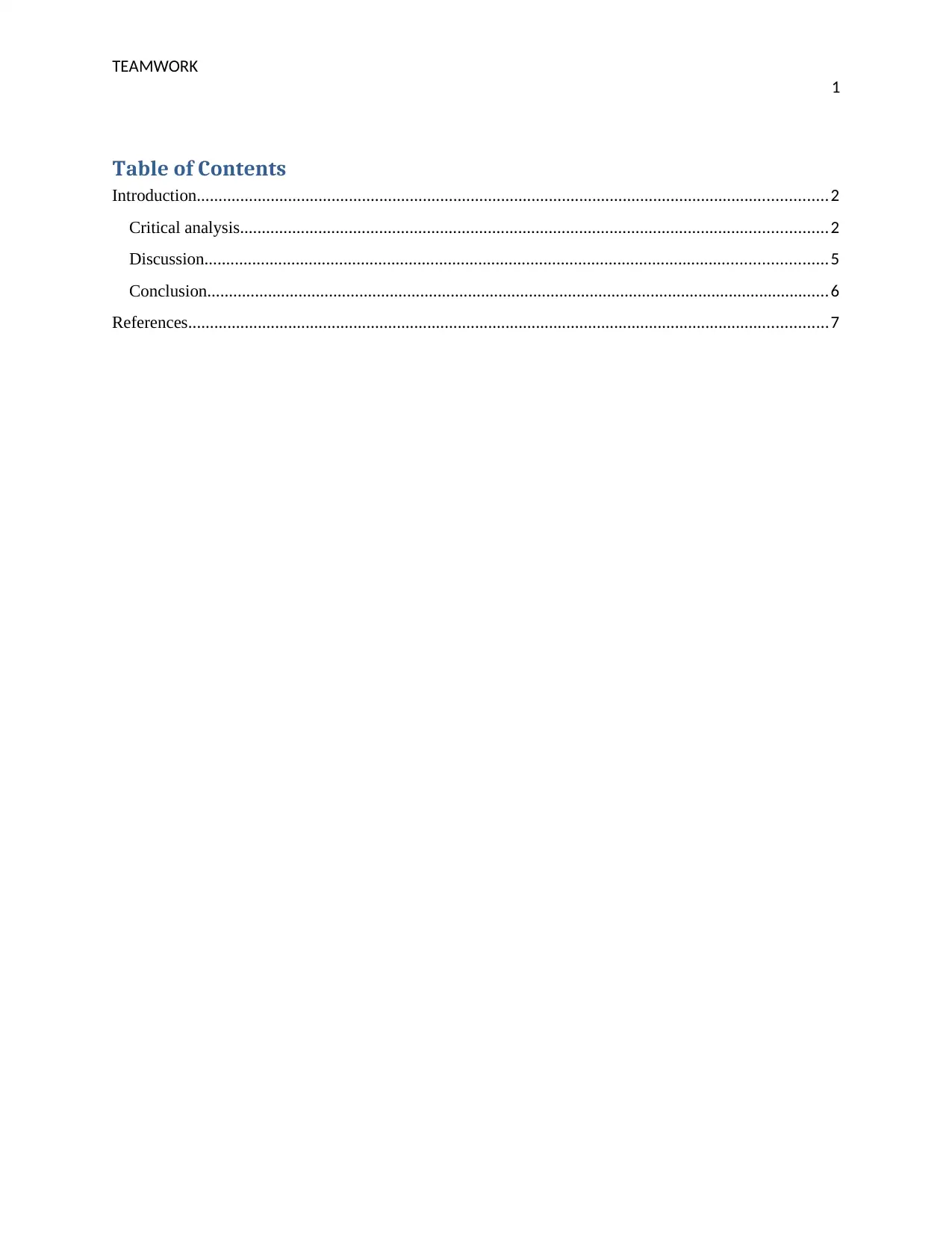
TEAMWORK
1
Table of Contents
Introduction.................................................................................................................................................2
Critical analysis.......................................................................................................................................2
Discussion...............................................................................................................................................5
Conclusion...............................................................................................................................................6
References...................................................................................................................................................7
1
Table of Contents
Introduction.................................................................................................................................................2
Critical analysis.......................................................................................................................................2
Discussion...............................................................................................................................................5
Conclusion...............................................................................................................................................6
References...................................................................................................................................................7
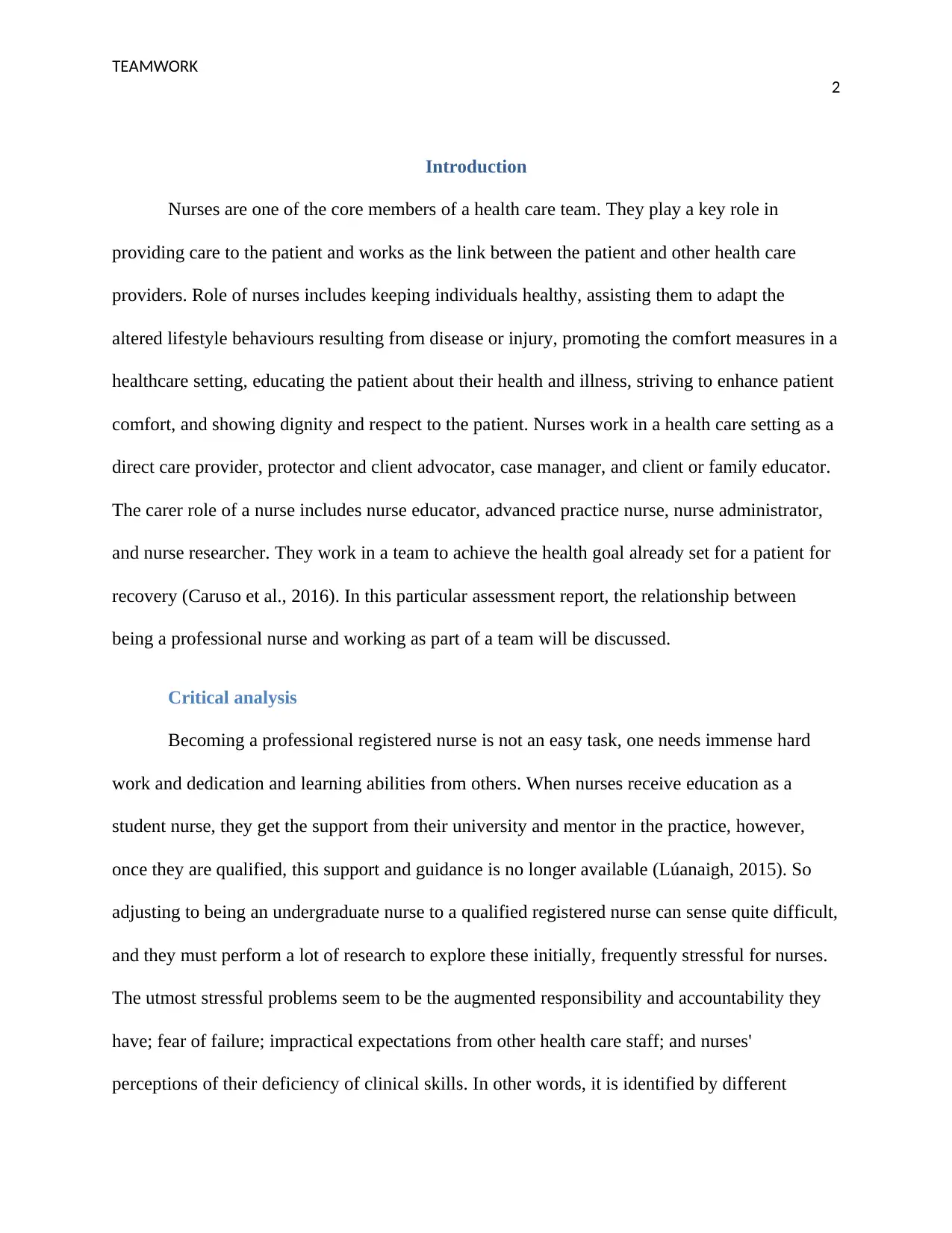
TEAMWORK
2
Introduction
Nurses are one of the core members of a health care team. They play a key role in
providing care to the patient and works as the link between the patient and other health care
providers. Role of nurses includes keeping individuals healthy, assisting them to adapt the
altered lifestyle behaviours resulting from disease or injury, promoting the comfort measures in a
healthcare setting, educating the patient about their health and illness, striving to enhance patient
comfort, and showing dignity and respect to the patient. Nurses work in a health care setting as a
direct care provider, protector and client advocator, case manager, and client or family educator.
The carer role of a nurse includes nurse educator, advanced practice nurse, nurse administrator,
and nurse researcher. They work in a team to achieve the health goal already set for a patient for
recovery (Caruso et al., 2016). In this particular assessment report, the relationship between
being a professional nurse and working as part of a team will be discussed.
Critical analysis
Becoming a professional registered nurse is not an easy task, one needs immense hard
work and dedication and learning abilities from others. When nurses receive education as a
student nurse, they get the support from their university and mentor in the practice, however,
once they are qualified, this support and guidance is no longer available (Lúanaigh, 2015). So
adjusting to being an undergraduate nurse to a qualified registered nurse can sense quite difficult,
and they must perform a lot of research to explore these initially, frequently stressful for nurses.
The utmost stressful problems seem to be the augmented responsibility and accountability they
have; fear of failure; impractical expectations from other health care staff; and nurses'
perceptions of their deficiency of clinical skills. In other words, it is identified by different
2
Introduction
Nurses are one of the core members of a health care team. They play a key role in
providing care to the patient and works as the link between the patient and other health care
providers. Role of nurses includes keeping individuals healthy, assisting them to adapt the
altered lifestyle behaviours resulting from disease or injury, promoting the comfort measures in a
healthcare setting, educating the patient about their health and illness, striving to enhance patient
comfort, and showing dignity and respect to the patient. Nurses work in a health care setting as a
direct care provider, protector and client advocator, case manager, and client or family educator.
The carer role of a nurse includes nurse educator, advanced practice nurse, nurse administrator,
and nurse researcher. They work in a team to achieve the health goal already set for a patient for
recovery (Caruso et al., 2016). In this particular assessment report, the relationship between
being a professional nurse and working as part of a team will be discussed.
Critical analysis
Becoming a professional registered nurse is not an easy task, one needs immense hard
work and dedication and learning abilities from others. When nurses receive education as a
student nurse, they get the support from their university and mentor in the practice, however,
once they are qualified, this support and guidance is no longer available (Lúanaigh, 2015). So
adjusting to being an undergraduate nurse to a qualified registered nurse can sense quite difficult,
and they must perform a lot of research to explore these initially, frequently stressful for nurses.
The utmost stressful problems seem to be the augmented responsibility and accountability they
have; fear of failure; impractical expectations from other health care staff; and nurses'
perceptions of their deficiency of clinical skills. In other words, it is identified by different
⊘ This is a preview!⊘
Do you want full access?
Subscribe today to unlock all pages.

Trusted by 1+ million students worldwide
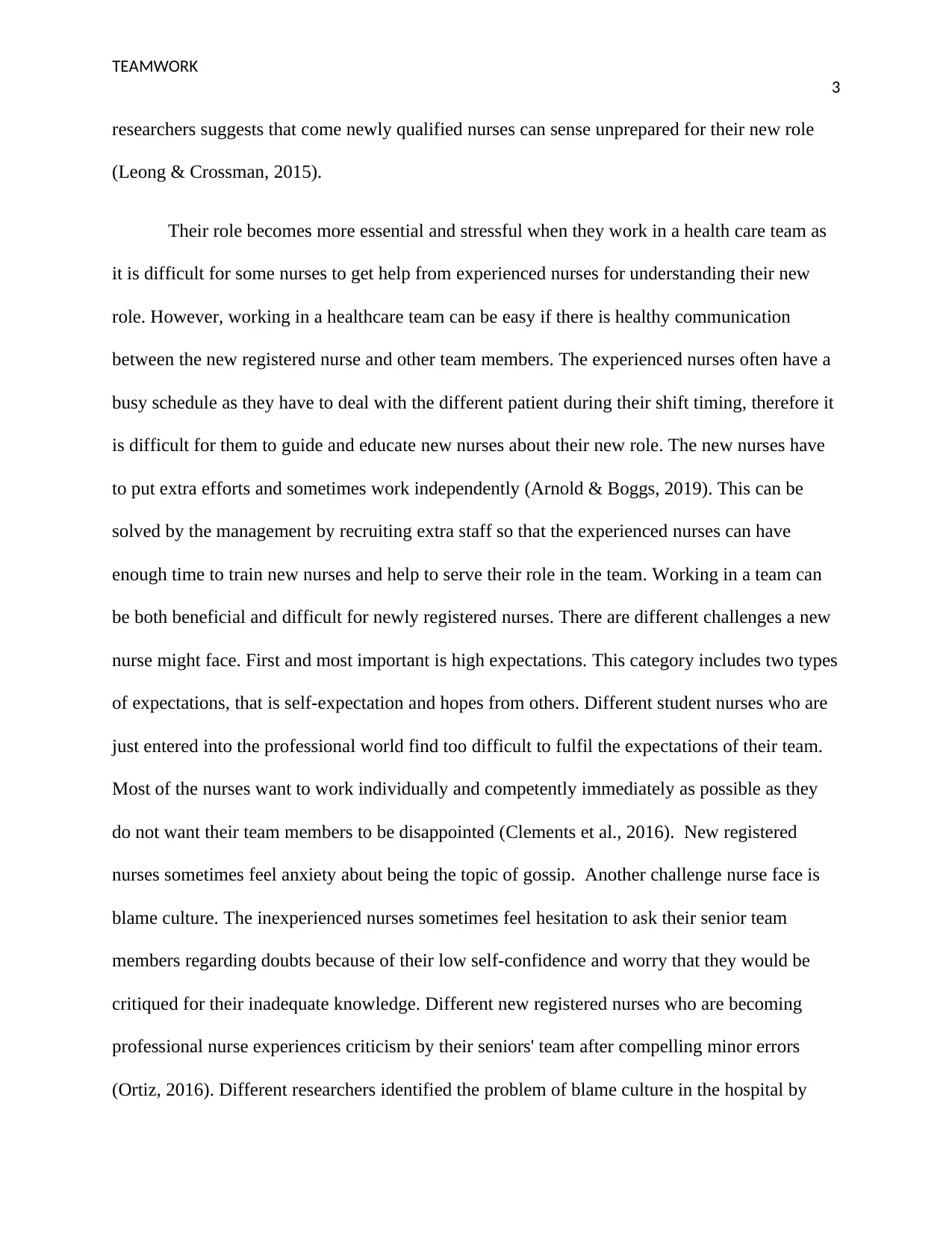
TEAMWORK
3
researchers suggests that come newly qualified nurses can sense unprepared for their new role
(Leong & Crossman, 2015).
Their role becomes more essential and stressful when they work in a health care team as
it is difficult for some nurses to get help from experienced nurses for understanding their new
role. However, working in a healthcare team can be easy if there is healthy communication
between the new registered nurse and other team members. The experienced nurses often have a
busy schedule as they have to deal with the different patient during their shift timing, therefore it
is difficult for them to guide and educate new nurses about their new role. The new nurses have
to put extra efforts and sometimes work independently (Arnold & Boggs, 2019). This can be
solved by the management by recruiting extra staff so that the experienced nurses can have
enough time to train new nurses and help to serve their role in the team. Working in a team can
be both beneficial and difficult for newly registered nurses. There are different challenges a new
nurse might face. First and most important is high expectations. This category includes two types
of expectations, that is self-expectation and hopes from others. Different student nurses who are
just entered into the professional world find too difficult to fulfil the expectations of their team.
Most of the nurses want to work individually and competently immediately as possible as they
do not want their team members to be disappointed (Clements et al., 2016). New registered
nurses sometimes feel anxiety about being the topic of gossip. Another challenge nurse face is
blame culture. The inexperienced nurses sometimes feel hesitation to ask their senior team
members regarding doubts because of their low self-confidence and worry that they would be
critiqued for their inadequate knowledge. Different new registered nurses who are becoming
professional nurse experiences criticism by their seniors' team after compelling minor errors
(Ortiz, 2016). Different researchers identified the problem of blame culture in the hospital by
3
researchers suggests that come newly qualified nurses can sense unprepared for their new role
(Leong & Crossman, 2015).
Their role becomes more essential and stressful when they work in a health care team as
it is difficult for some nurses to get help from experienced nurses for understanding their new
role. However, working in a healthcare team can be easy if there is healthy communication
between the new registered nurse and other team members. The experienced nurses often have a
busy schedule as they have to deal with the different patient during their shift timing, therefore it
is difficult for them to guide and educate new nurses about their new role. The new nurses have
to put extra efforts and sometimes work independently (Arnold & Boggs, 2019). This can be
solved by the management by recruiting extra staff so that the experienced nurses can have
enough time to train new nurses and help to serve their role in the team. Working in a team can
be both beneficial and difficult for newly registered nurses. There are different challenges a new
nurse might face. First and most important is high expectations. This category includes two types
of expectations, that is self-expectation and hopes from others. Different student nurses who are
just entered into the professional world find too difficult to fulfil the expectations of their team.
Most of the nurses want to work individually and competently immediately as possible as they
do not want their team members to be disappointed (Clements et al., 2016). New registered
nurses sometimes feel anxiety about being the topic of gossip. Another challenge nurse face is
blame culture. The inexperienced nurses sometimes feel hesitation to ask their senior team
members regarding doubts because of their low self-confidence and worry that they would be
critiqued for their inadequate knowledge. Different new registered nurses who are becoming
professional nurse experiences criticism by their seniors' team after compelling minor errors
(Ortiz, 2016). Different researchers identified the problem of blame culture in the hospital by
Paraphrase This Document
Need a fresh take? Get an instant paraphrase of this document with our AI Paraphraser
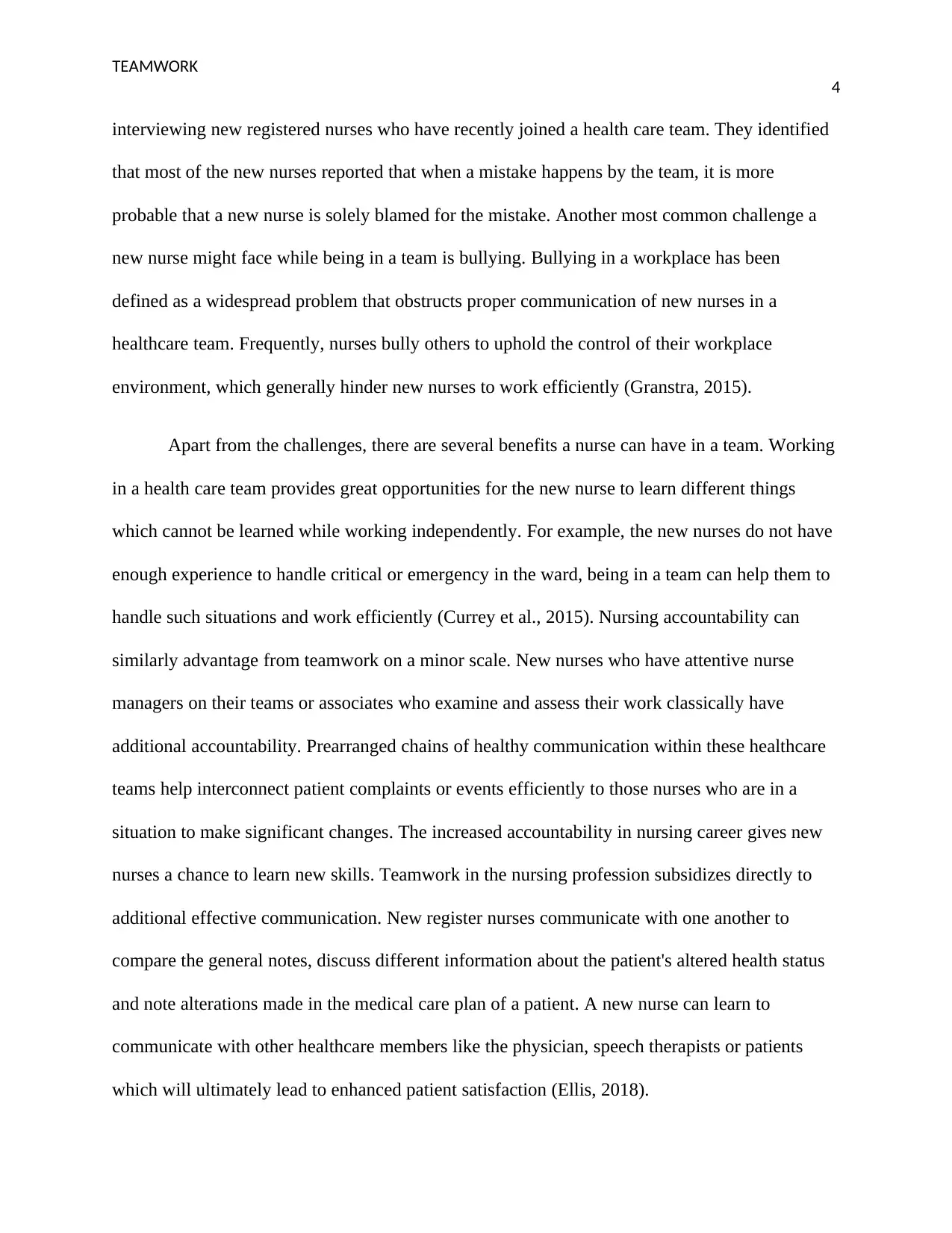
TEAMWORK
4
interviewing new registered nurses who have recently joined a health care team. They identified
that most of the new nurses reported that when a mistake happens by the team, it is more
probable that a new nurse is solely blamed for the mistake. Another most common challenge a
new nurse might face while being in a team is bullying. Bullying in a workplace has been
defined as a widespread problem that obstructs proper communication of new nurses in a
healthcare team. Frequently, nurses bully others to uphold the control of their workplace
environment, which generally hinder new nurses to work efficiently (Granstra, 2015).
Apart from the challenges, there are several benefits a nurse can have in a team. Working
in a health care team provides great opportunities for the new nurse to learn different things
which cannot be learned while working independently. For example, the new nurses do not have
enough experience to handle critical or emergency in the ward, being in a team can help them to
handle such situations and work efficiently (Currey et al., 2015). Nursing accountability can
similarly advantage from teamwork on a minor scale. New nurses who have attentive nurse
managers on their teams or associates who examine and assess their work classically have
additional accountability. Prearranged chains of healthy communication within these healthcare
teams help interconnect patient complaints or events efficiently to those nurses who are in a
situation to make significant changes. The increased accountability in nursing career gives new
nurses a chance to learn new skills. Teamwork in the nursing profession subsidizes directly to
additional effective communication. New register nurses communicate with one another to
compare the general notes, discuss different information about the patient's altered health status
and note alterations made in the medical care plan of a patient. A new nurse can learn to
communicate with other healthcare members like the physician, speech therapists or patients
which will ultimately lead to enhanced patient satisfaction (Ellis, 2018).
4
interviewing new registered nurses who have recently joined a health care team. They identified
that most of the new nurses reported that when a mistake happens by the team, it is more
probable that a new nurse is solely blamed for the mistake. Another most common challenge a
new nurse might face while being in a team is bullying. Bullying in a workplace has been
defined as a widespread problem that obstructs proper communication of new nurses in a
healthcare team. Frequently, nurses bully others to uphold the control of their workplace
environment, which generally hinder new nurses to work efficiently (Granstra, 2015).
Apart from the challenges, there are several benefits a nurse can have in a team. Working
in a health care team provides great opportunities for the new nurse to learn different things
which cannot be learned while working independently. For example, the new nurses do not have
enough experience to handle critical or emergency in the ward, being in a team can help them to
handle such situations and work efficiently (Currey et al., 2015). Nursing accountability can
similarly advantage from teamwork on a minor scale. New nurses who have attentive nurse
managers on their teams or associates who examine and assess their work classically have
additional accountability. Prearranged chains of healthy communication within these healthcare
teams help interconnect patient complaints or events efficiently to those nurses who are in a
situation to make significant changes. The increased accountability in nursing career gives new
nurses a chance to learn new skills. Teamwork in the nursing profession subsidizes directly to
additional effective communication. New register nurses communicate with one another to
compare the general notes, discuss different information about the patient's altered health status
and note alterations made in the medical care plan of a patient. A new nurse can learn to
communicate with other healthcare members like the physician, speech therapists or patients
which will ultimately lead to enhanced patient satisfaction (Ellis, 2018).
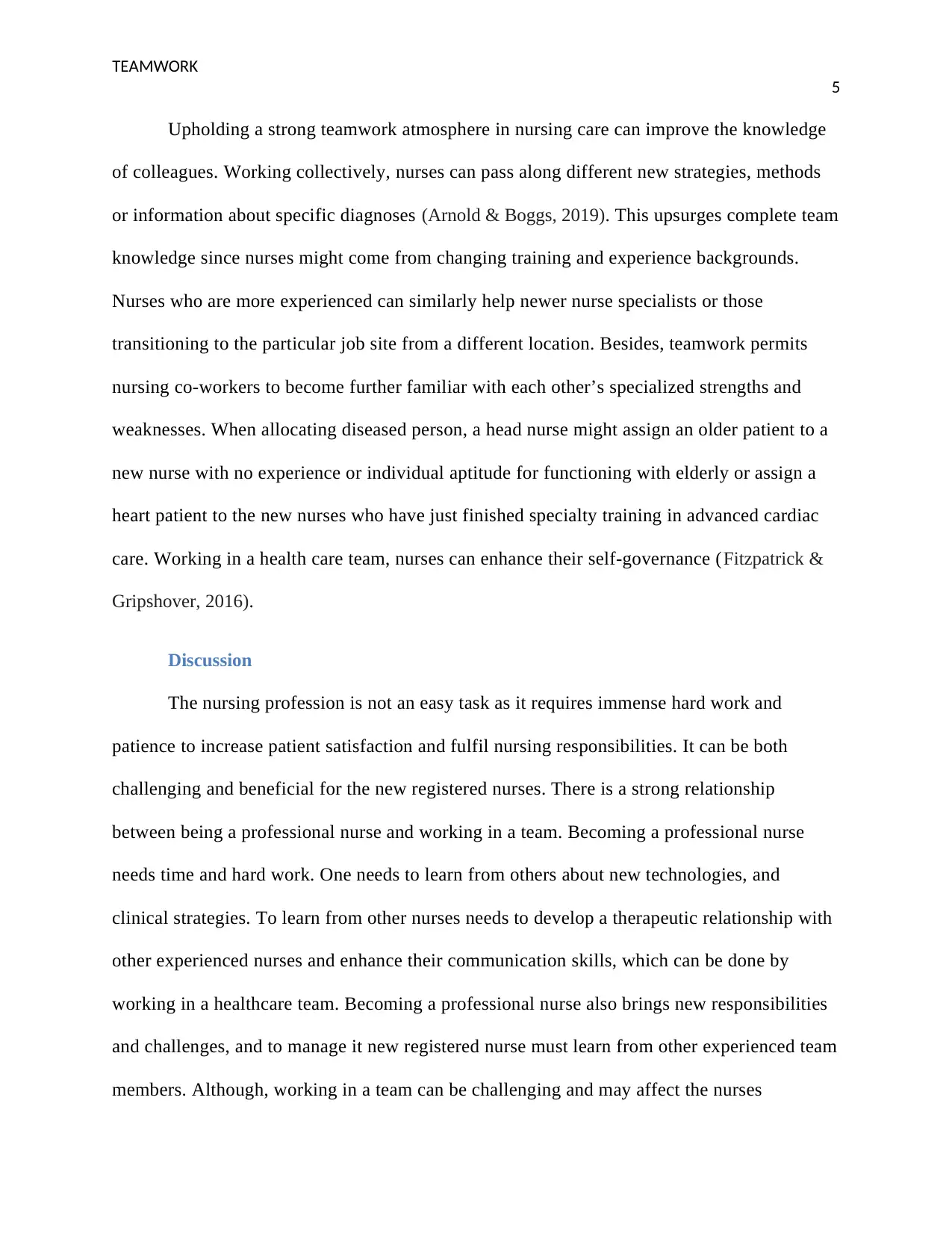
TEAMWORK
5
Upholding a strong teamwork atmosphere in nursing care can improve the knowledge
of colleagues. Working collectively, nurses can pass along different new strategies, methods
or information about specific diagnoses (Arnold & Boggs, 2019). This upsurges complete team
knowledge since nurses might come from changing training and experience backgrounds.
Nurses who are more experienced can similarly help newer nurse specialists or those
transitioning to the particular job site from a different location. Besides, teamwork permits
nursing co-workers to become further familiar with each other’s specialized strengths and
weaknesses. When allocating diseased person, a head nurse might assign an older patient to a
new nurse with no experience or individual aptitude for functioning with elderly or assign a
heart patient to the new nurses who have just finished specialty training in advanced cardiac
care. Working in a health care team, nurses can enhance their self-governance (Fitzpatrick &
Gripshover, 2016).
Discussion
The nursing profession is not an easy task as it requires immense hard work and
patience to increase patient satisfaction and fulfil nursing responsibilities. It can be both
challenging and beneficial for the new registered nurses. There is a strong relationship
between being a professional nurse and working in a team. Becoming a professional nurse
needs time and hard work. One needs to learn from others about new technologies, and
clinical strategies. To learn from other nurses needs to develop a therapeutic relationship with
other experienced nurses and enhance their communication skills, which can be done by
working in a healthcare team. Becoming a professional nurse also brings new responsibilities
and challenges, and to manage it new registered nurse must learn from other experienced team
members. Although, working in a team can be challenging and may affect the nurses
5
Upholding a strong teamwork atmosphere in nursing care can improve the knowledge
of colleagues. Working collectively, nurses can pass along different new strategies, methods
or information about specific diagnoses (Arnold & Boggs, 2019). This upsurges complete team
knowledge since nurses might come from changing training and experience backgrounds.
Nurses who are more experienced can similarly help newer nurse specialists or those
transitioning to the particular job site from a different location. Besides, teamwork permits
nursing co-workers to become further familiar with each other’s specialized strengths and
weaknesses. When allocating diseased person, a head nurse might assign an older patient to a
new nurse with no experience or individual aptitude for functioning with elderly or assign a
heart patient to the new nurses who have just finished specialty training in advanced cardiac
care. Working in a health care team, nurses can enhance their self-governance (Fitzpatrick &
Gripshover, 2016).
Discussion
The nursing profession is not an easy task as it requires immense hard work and
patience to increase patient satisfaction and fulfil nursing responsibilities. It can be both
challenging and beneficial for the new registered nurses. There is a strong relationship
between being a professional nurse and working in a team. Becoming a professional nurse
needs time and hard work. One needs to learn from others about new technologies, and
clinical strategies. To learn from other nurses needs to develop a therapeutic relationship with
other experienced nurses and enhance their communication skills, which can be done by
working in a healthcare team. Becoming a professional nurse also brings new responsibilities
and challenges, and to manage it new registered nurse must learn from other experienced team
members. Although, working in a team can be challenging and may affect the nurses
⊘ This is a preview!⊘
Do you want full access?
Subscribe today to unlock all pages.

Trusted by 1+ million students worldwide
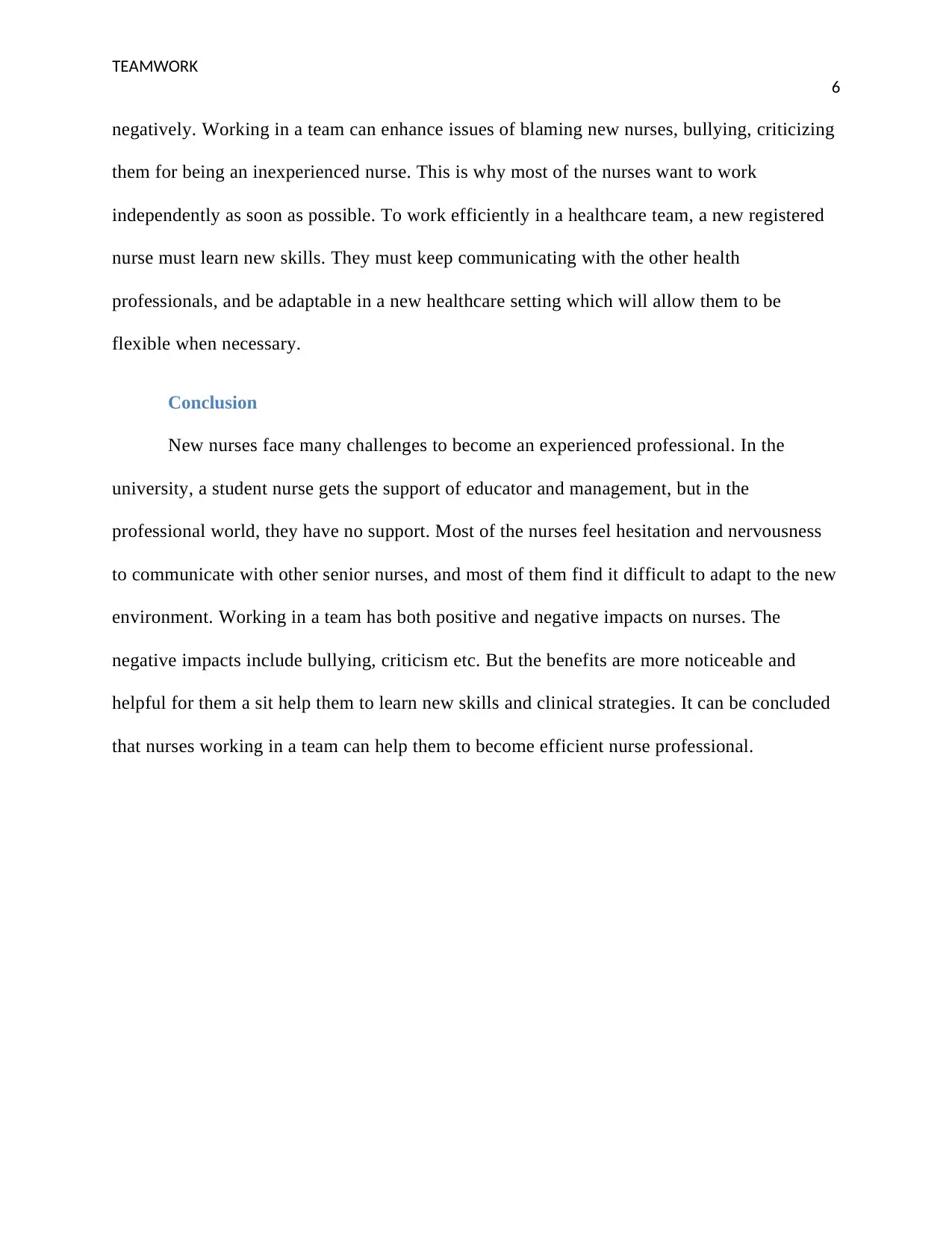
TEAMWORK
6
negatively. Working in a team can enhance issues of blaming new nurses, bullying, criticizing
them for being an inexperienced nurse. This is why most of the nurses want to work
independently as soon as possible. To work efficiently in a healthcare team, a new registered
nurse must learn new skills. They must keep communicating with the other health
professionals, and be adaptable in a new healthcare setting which will allow them to be
flexible when necessary.
Conclusion
New nurses face many challenges to become an experienced professional. In the
university, a student nurse gets the support of educator and management, but in the
professional world, they have no support. Most of the nurses feel hesitation and nervousness
to communicate with other senior nurses, and most of them find it difficult to adapt to the new
environment. Working in a team has both positive and negative impacts on nurses. The
negative impacts include bullying, criticism etc. But the benefits are more noticeable and
helpful for them a sit help them to learn new skills and clinical strategies. It can be concluded
that nurses working in a team can help them to become efficient nurse professional.
6
negatively. Working in a team can enhance issues of blaming new nurses, bullying, criticizing
them for being an inexperienced nurse. This is why most of the nurses want to work
independently as soon as possible. To work efficiently in a healthcare team, a new registered
nurse must learn new skills. They must keep communicating with the other health
professionals, and be adaptable in a new healthcare setting which will allow them to be
flexible when necessary.
Conclusion
New nurses face many challenges to become an experienced professional. In the
university, a student nurse gets the support of educator and management, but in the
professional world, they have no support. Most of the nurses feel hesitation and nervousness
to communicate with other senior nurses, and most of them find it difficult to adapt to the new
environment. Working in a team has both positive and negative impacts on nurses. The
negative impacts include bullying, criticism etc. But the benefits are more noticeable and
helpful for them a sit help them to learn new skills and clinical strategies. It can be concluded
that nurses working in a team can help them to become efficient nurse professional.
Paraphrase This Document
Need a fresh take? Get an instant paraphrase of this document with our AI Paraphraser
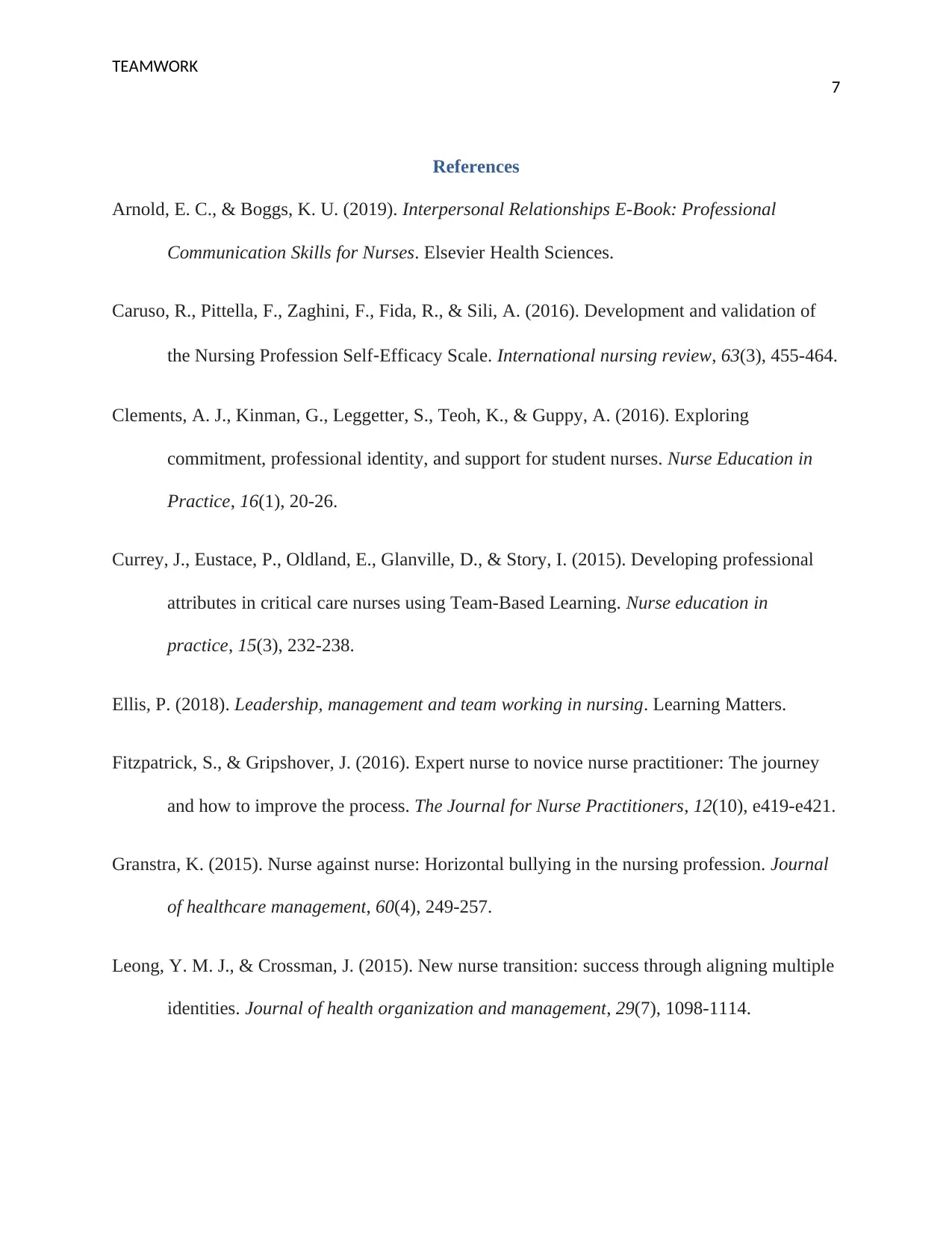
TEAMWORK
7
References
Arnold, E. C., & Boggs, K. U. (2019). Interpersonal Relationships E-Book: Professional
Communication Skills for Nurses. Elsevier Health Sciences.
Caruso, R., Pittella, F., Zaghini, F., Fida, R., & Sili, A. (2016). Development and validation of
the Nursing Profession Self‐Efficacy Scale. International nursing review, 63(3), 455-464.
Clements, A. J., Kinman, G., Leggetter, S., Teoh, K., & Guppy, A. (2016). Exploring
commitment, professional identity, and support for student nurses. Nurse Education in
Practice, 16(1), 20-26.
Currey, J., Eustace, P., Oldland, E., Glanville, D., & Story, I. (2015). Developing professional
attributes in critical care nurses using Team-Based Learning. Nurse education in
practice, 15(3), 232-238.
Ellis, P. (2018). Leadership, management and team working in nursing. Learning Matters.
Fitzpatrick, S., & Gripshover, J. (2016). Expert nurse to novice nurse practitioner: The journey
and how to improve the process. The Journal for Nurse Practitioners, 12(10), e419-e421.
Granstra, K. (2015). Nurse against nurse: Horizontal bullying in the nursing profession. Journal
of healthcare management, 60(4), 249-257.
Leong, Y. M. J., & Crossman, J. (2015). New nurse transition: success through aligning multiple
identities. Journal of health organization and management, 29(7), 1098-1114.
7
References
Arnold, E. C., & Boggs, K. U. (2019). Interpersonal Relationships E-Book: Professional
Communication Skills for Nurses. Elsevier Health Sciences.
Caruso, R., Pittella, F., Zaghini, F., Fida, R., & Sili, A. (2016). Development and validation of
the Nursing Profession Self‐Efficacy Scale. International nursing review, 63(3), 455-464.
Clements, A. J., Kinman, G., Leggetter, S., Teoh, K., & Guppy, A. (2016). Exploring
commitment, professional identity, and support for student nurses. Nurse Education in
Practice, 16(1), 20-26.
Currey, J., Eustace, P., Oldland, E., Glanville, D., & Story, I. (2015). Developing professional
attributes in critical care nurses using Team-Based Learning. Nurse education in
practice, 15(3), 232-238.
Ellis, P. (2018). Leadership, management and team working in nursing. Learning Matters.
Fitzpatrick, S., & Gripshover, J. (2016). Expert nurse to novice nurse practitioner: The journey
and how to improve the process. The Journal for Nurse Practitioners, 12(10), e419-e421.
Granstra, K. (2015). Nurse against nurse: Horizontal bullying in the nursing profession. Journal
of healthcare management, 60(4), 249-257.
Leong, Y. M. J., & Crossman, J. (2015). New nurse transition: success through aligning multiple
identities. Journal of health organization and management, 29(7), 1098-1114.
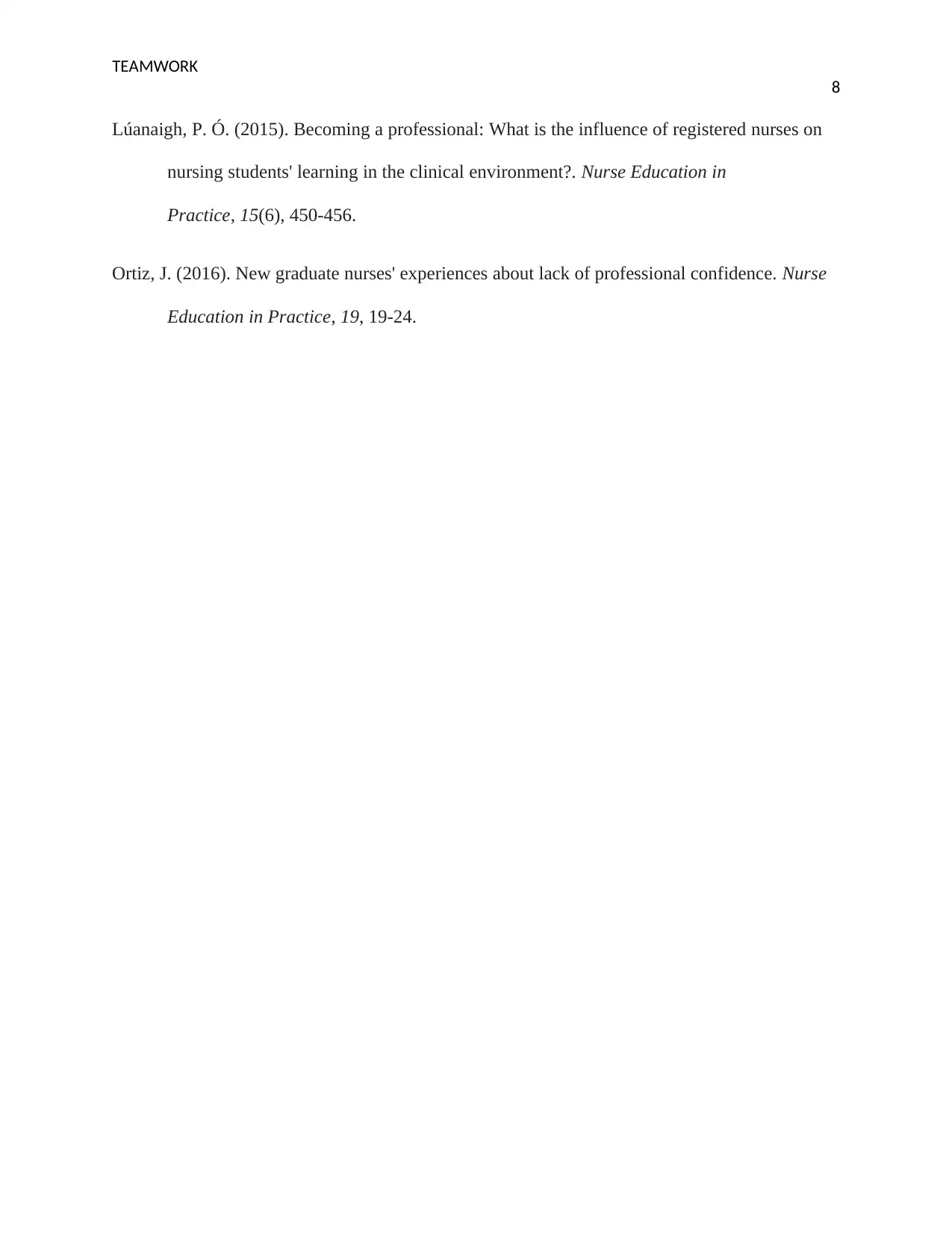
TEAMWORK
8
Lúanaigh, P. Ó. (2015). Becoming a professional: What is the influence of registered nurses on
nursing students' learning in the clinical environment?. Nurse Education in
Practice, 15(6), 450-456.
Ortiz, J. (2016). New graduate nurses' experiences about lack of professional confidence. Nurse
Education in Practice, 19, 19-24.
8
Lúanaigh, P. Ó. (2015). Becoming a professional: What is the influence of registered nurses on
nursing students' learning in the clinical environment?. Nurse Education in
Practice, 15(6), 450-456.
Ortiz, J. (2016). New graduate nurses' experiences about lack of professional confidence. Nurse
Education in Practice, 19, 19-24.
⊘ This is a preview!⊘
Do you want full access?
Subscribe today to unlock all pages.

Trusted by 1+ million students worldwide
1 out of 9
Related Documents
Your All-in-One AI-Powered Toolkit for Academic Success.
+13062052269
info@desklib.com
Available 24*7 on WhatsApp / Email
![[object Object]](/_next/static/media/star-bottom.7253800d.svg)
Unlock your academic potential
Copyright © 2020–2026 A2Z Services. All Rights Reserved. Developed and managed by ZUCOL.





